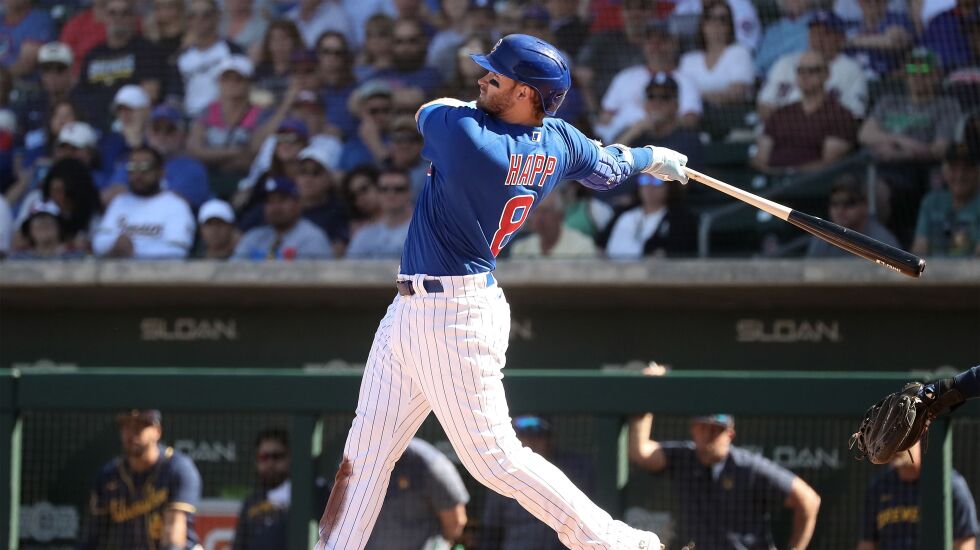
MESA, Ariz. – Cubs left fielder Ian Happ has seen this plot play out before.
Two years ago, Anthony Rizzo and his representatives engaged with the Cubs in extension talks through the spring training of his walk year — then reached the end of camp without an agreement.
The Cubs didn’t extend Javy Báez or Kris Bryant that year, either. They watched Willson Contreras walk after last season.
Now, Happ is in his final year of club control, and history has begun to repeat itself.
“There’s no right way to do it,” Happ told the Sun-Times when asked what he learned from observing his former teammates in their walk years, “and that it’s very true that you can only control what you can control.”
Both Happ and the Cubs have declined to comment on the progress of their negotiations, which began over the offseason. But spring training is almost over, and it appears the two parties are still far apart.
Starting extension talks before spring training was a conscious adjustment.
“Don’t hold me to this, but I don’t really love negotiating in spring training,” team president Jed Hoyer said during the general managers’ meetings in November. “The more I do it, the more I think it causes real tension. Guys want to start the season. I’ve watched many deals fall apart in spring training. I just don’t think it’s a great way to start the season.”
When spring training began, Hoyer said he didn’t see the beginning of camp as a hard deadline. This weekend, Happ said something similar about Opening Day.
“I don’t think there’s any benefit of putting deadlines out there,” he said, “so it’s a fluid conversation.”
The gap between the two parties now, however, points to a difference in expectations of the upcoming free-agent market.
Shohei Ohtani obviously sits at the top of the class, but Happ is expected to be in the upper echelon of position players. Manny Machado’s and Rafael Devers’s extensions only helped Happ’s standing.
He is coming off a breakout year, in which he claimed his first All-Star selection and Gold Glove. And he has emerged as a leader on the team.
“He’s always had a great way about him that guys are drawn to,” manager David Ross said. “Just the consistency that he brings every day is valuable.”
Paired with track record, a player’s platform year does mean a lot in free agency. If Happ can replicate his production from last season, or come close to it, he’s headed for a big pay day.
Left fielder Andrew Benintendi, who didn’t put up the wins above replacement (2.8, per FanGraphs) that Happ did last year (3.5), signed with the White Sox for five years, $75 million this winter.
The year before, right fielder Nick Castellanos, who had a 3.5 fWAR in his platform season – albeit with better offensive numbers and a worse defensive record than Happ – signed with the Phillies for five years and a whopping $100 million. Philadelphia also signed left fielder Kyle Schwarber (2.8 fWAR in his platform year) to a four-year, $79 million deal last March.
Keep in mind, the market is changing. By mid-January, teams had already guaranteed players a record $3.8 billion this winter. And the offseason’s action naturally raised the bar across the league in contract extension talks. Devers agreed to $331 million for 11 years with Boston and Machado signed an 11-year, $350 million extension with the Padres.
Now teams are trying to figure out how much of the trend was big-spending teams seizing on a star-powered free agent class, and how much is here to stay.
Happ, a member of the MLBPA executive subcommittee, is in tune with MLB spending trends. But he continues to speak highly of his time in Chicago. There’s a sense he would take what his camp would consider to be a hometown discount to stay with the Cubs.
The two parties, however, are running out of time to close the gap.







